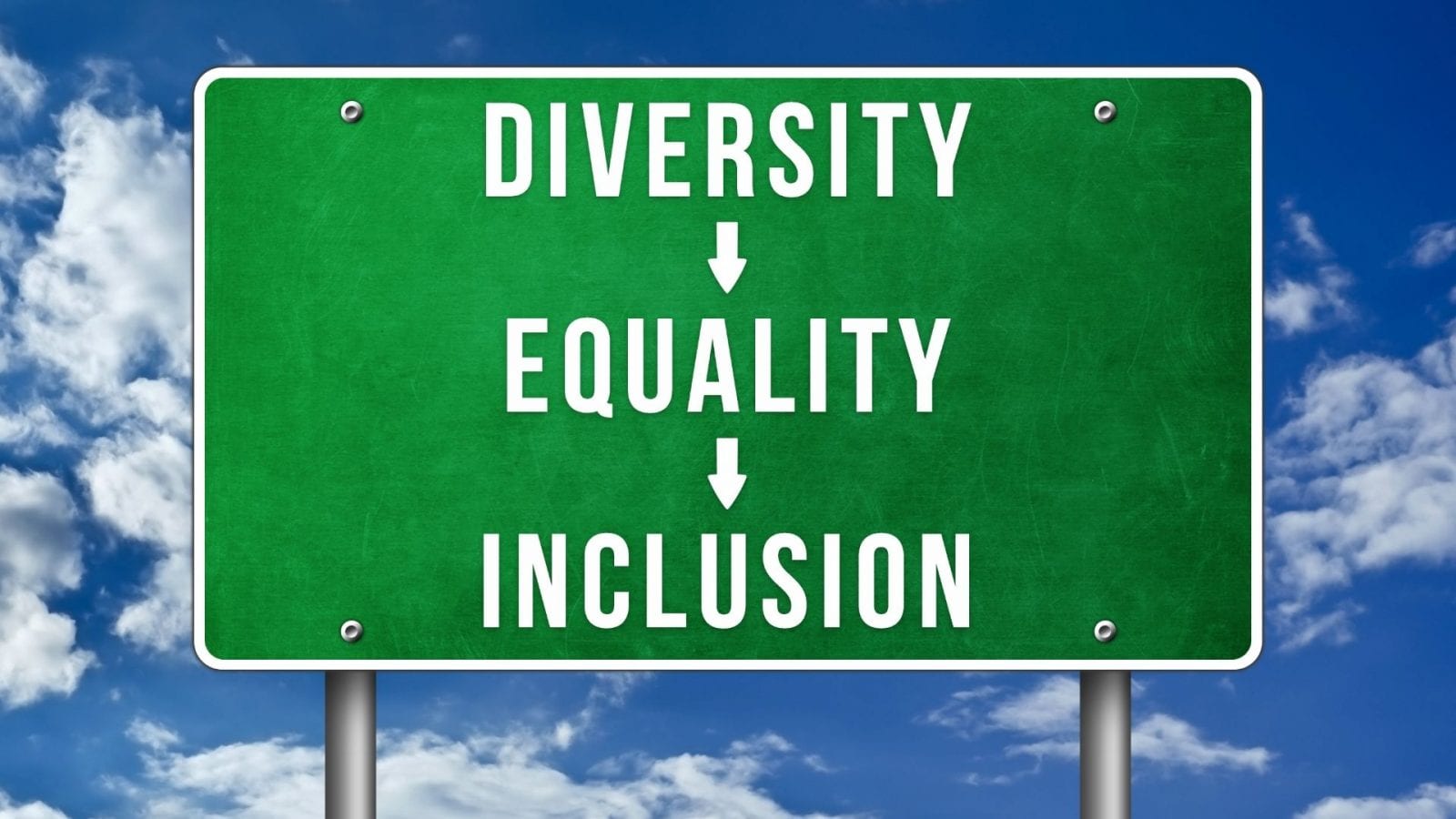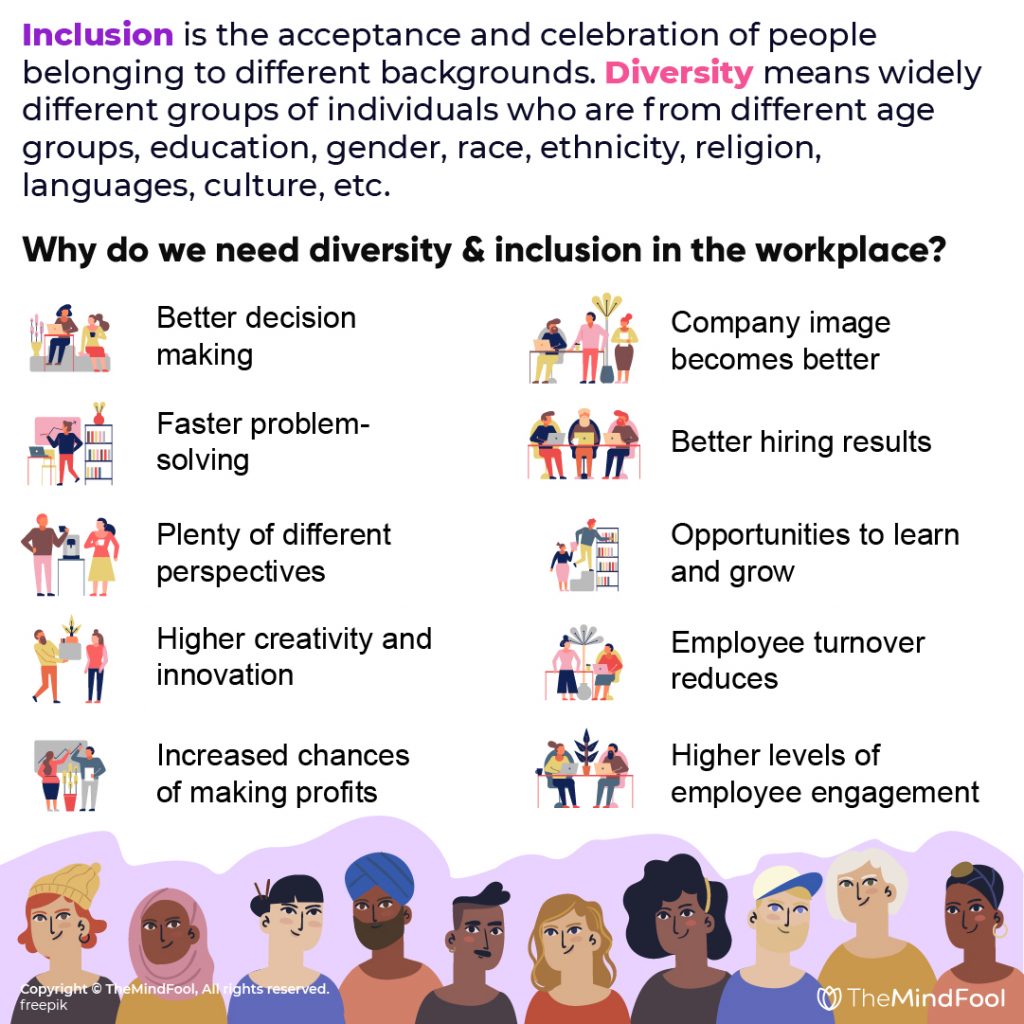
What does inclusion mean in today’s modern society? Well, it makes all the difference in the world! If people of all cultures are not included then the human race most inevitably will fail together.
And diversity initiatives are nowadays not just the theories described on paper, it is high time that these are being implemented in workplaces, schools, and organizations all over the world to uplift the human race and prove the humanity that still prevails.
What Does Inclusion Mean?
Inclusion is a practice to provide equal opportunities and access to resources to people who are members of minority groups or are marginalized because they are differently-abled physically or mentally.
Inclusion is the acceptance and celebration of people belonging to different backgrounds.
What Does Diversity Mean?
Diversity means widely different groups of individuals. To define diversity we have to first understand the importance of all groups of people in society. Instead of discriminating against people for their gender identity, national origin, religion, or culture, the open-mindedness to welcome people of all groups wholeheartedly defines diversity in the truest essence.
Diversity in the workplace or classrooms refers to people who are of various age groups, educational backgrounds, sexual orientations, gender, race, ethnicity, religion, languages, abilities, culture, socio-economic status, etc.

Top 10 Benefits of Diversity and Inclusion in the Workplace
National origin discrimination is an offense and currently, companies are avoiding it and encouraging a more diverse workforce. Diversity and inclusion in the workplace have obvious benefits that have been studied and validated by the HR industry.
These two aspects are what most companies nowadays are striving to achieve. Diversity and inclusion are not just the hottest fads but these do have proven competitive advantage for the companies which implement those.
We would discuss the 10 advantages of these practices.
1. Better decision making
When the workforce includes members from different backgrounds with various perspectives they come up with innovative solutions. This allows the company to look into the problems from different angles and as a result, make better decisions and earn more profits.
2. Faster problem-solving
According to Harvard Business Review, diverse teams are quick problem solvers! Employees with diverse backgrounds will approach any problem differently and they would provide unique ways to cope up with any crisis. As a result, the situation will be handled really quickly.
3. Plenty of different perspectives
In an inclusive workplace, the fresh flow of the perspectives will always help the company to grow and stay ahead of the competitors.
4. Higher creativity and innovation
When employees come from various cultures they would handle duties using their specific touches and this generates a pool of creativity and innovative ideas.
5. Increased chances of making profits
Companies with diverse teams achieve more of their financial goals and make more profit. A recent study conducted by the Boston Consulting Group, BCG indicates that a diverse workforce results in better innovative strategies and increased financial gains.
6. Higher levels of employee engagement
One of the benefits of diversity in the work environment is that it has higher levels of employee engagement. Recent researches show that when employees feel included they contribute fully and become more engaged.
7. Employee turnover reduces
In an inclusive environment, employees feel accepted as they get equal opportunities and treatment. Therefore, they become more committed to their job and do not leave. Simply put, when employees are satisfied the retention rate improves.
8. Company image becomes better
Diversity and inclusivity in the workplace create a better image for the company. When the company HRs are wise enough to include people with different sexual orientations or with disabilities, the brand immediately gets more attention from customers and business partners.
The company is perceived in a positive light and is considered as socially responsible by the media and people in general.
9. Better hiring results
Commitment to diversity can be beneficial for the entire recruitment process. Inclusive work culture has a pool of diverse talents. Also, in this environment employees experience a sense of belonging and that definitely increases employee engagement.
Often an unconscious bias training is provided to the recruitment teams so that they can impartially hire candidates based on their merits.
10. Opportunities to learn and grow
When a company is committed to diversity it creates an environment to nurture the diverse talents, ideas, opinions, and innovations. While building a diverse and inclusive culture they provide more scope of learning and development.
This promotes employee resource groups that help with improvement in the quality of work.
Special Education and General Education
Previously children with learning difficulties were taught in a very exclusive environment focusing on individual educational needs. This is termed as special education. Whereas, the general education system is a traditional classroom setting in which the teachers would address the entire class. Special education and general education are totally opposite to one another. While inclusive education is an attempt to bridge the gap.
The school community is nowadays opting for inclusive education in general education classes. Also, the textbooks are using more gender-neutral terms to prevent impressing young minds with gender biases. Inclusive education is getting popular nowadays at secondary as well as in the high school level.
What is Inclusive Education?
Inclusive education denotes a system of learning that is conducted in a common learning environment. A common learning environment is an inclusive setting in which students from various backgrounds or having different learning abilities would receive an age-appropriate, high-quality education in general education classes of neighborhood schools.
Here, children with disabilities would also be included. It is not at all a restrictive environment! In fact, it is a healthy learning environment where each pupil is encouraged to participate fully.
What Are Inclusive Classrooms?
An inclusive classroom is a positive learning environment to ensure that students with special needs would get the opportunity to learn along with students without disabilities. They would all participate together with a sense of belonging. The learning procedure involves inclusive practices created to suit all students.
When schools make initiatives for improved diversity and inclusion and reform the educational programs it creates a positive, uplifting climate for each child.
Why Do We Need Inclusive Education?
• Diversity can be best demonstrated at a young age. When children learn in a diverse environment they subconsciously accept the importance of diversity and inclusion. This helps them to grow into open-minded individuals without societal prejudices.
• When children are taught in this inclusive setting from early childhood they develop acceptance and respect for all kinds of people irrespective of the differences. Because of that, they grow into responsible citizens.
• If normal children grow up with children with special needs they see and understand the struggles of their peers, as a result, they become more compassionate.
• Children in inclusive schools gain quality education and gain more insights than general education classrooms.
• The children with special needs get accustomed with peers without disabilities as they all learn together. They are accepted by their friends and so are not embarrassed about their challenges when they grow up.
• In a successful inclusive setting, the goal is to develop peer-supported groups where each child will be able to express themselves fully without hesitation or shame. This results in the emotional growth of the children.
Closing Thoughts
Diversity and inclusion are important topics not only for the HR Executives but for the society as a whole. The world can truly flourish when all groups of people would be recognized and respected. Nowadays inclusion is compulsorily practiced at workplaces and schools in various parts of the world.
The true success of human civilization would be marked when all people irrespective of religion, gender, race, ethnicity, religion, languages, abilities, culture, or socio-economic status would be wholeheartedly accepted everywhere in the world.
Also, read our next article, Small Fun Activities Employees Can Participate In
Ishita is a published author, poet and freelance writer. Being an avid reader from early childhood, she has always loved books more than anything else in the world! At the start of her career, she has worked in the corporate as well as the academic sector being a double master's degree holder - M.Sc and MBA. But now she is a fulltime writer. She believes words have immense power and writers can make a huge impact in the world! She wants to bring positivity into the lives of the readers through her association with TheMindFool.
